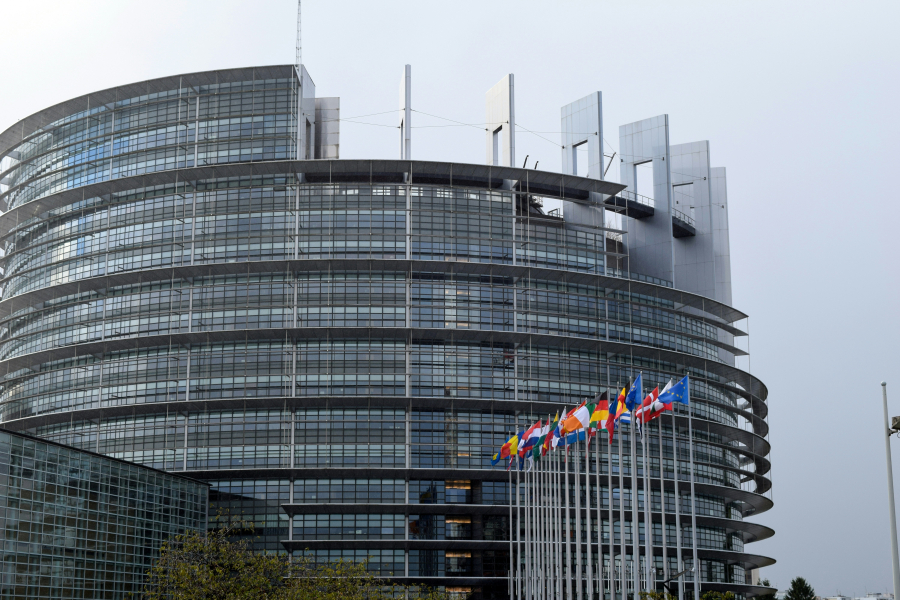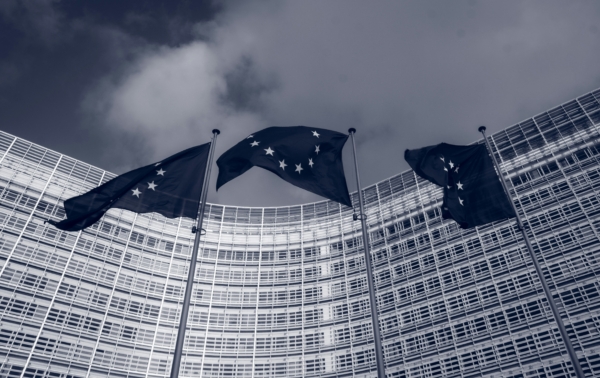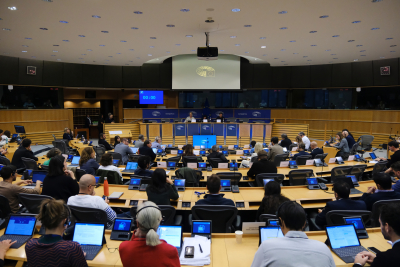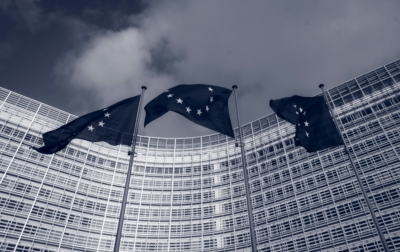It’s now almost a year since a new European Parliament was elected and a new crop of MEPs undertook their mandates to serve European citizens. It also means we now have a years’ worth of new lobby meeting data to sift through. We’ve taken it upon ourselves to analysis all of these meetings, showing the sheer scale of interactions between MEPs and interest representatives. We discuss what this means for the integrity of the European Parliament below.
With our updated dataset, we can reveal that MEPs have published over 30,000 meetings since the start of the mandate. This is an increase of 314% over a similar period in the last mandate. This huge increase can be attributed largely to the Parliament’s rule change, which now stipulates that all MEPs and their assistants must declare lobby meetings, including with both lobby organisations and representatives of third countries. Previously, only MEPs with specific leading functions (rapporteur, shadow rapporteur and committee chair) were required to declare who they were meeting.
That represents a big win for transparency, in line with the recommendations we have put forward and gives us greater insight into the goings-on at the European Parliament.
Delving into the data, we found that 14 of the 20 organisations with the largest number of meetings represent commercial interests. This is a large imbalance, but nevertheless a marked improvement on the European Commission, which has only three NGOs in its top 20. Unsurprisingly, the types of organisations MEPs are meeting reflect the political divide: we find higher civil society engagement on the left and a preference for industry players on the right.
We can also reveal more concerning matters:
- Philip Morris International, a tobacco company subject to the WHO Framework Convention on Tobacco Control, which includes strict limits on interactions with the industry, is among the top 20 organisations with most meetings.
- The European Sovereign Nations group and non-aligned members repeatedly meet with official representatives of authoritarian regimes, including from China, Russia and Belarus.
- We also noted a presence of meetings in the US conservative sphere, including US Republican members, and conservative organisations such as Republicans for National Renewal and the Heritage Foundation, both of which are not registered on the EU Transparency Register.
- The ENVI (Environment, Public Health and Food Safety) Committee’s most-met organisations include big fossil fuel players such as ExxonMobil and FuelsEurope. The latter, a large business association, is also among the top 20 organisations for the European Parliament.
We also had a closer look at the fossil fuel industry’s access to the European Parliament. Our findings reveal a concerning trend: in just one year, the top seven fossil fuel organisations (Shell, Eni, Total Energies, ExxonMobil, PB, Equinor and Chevron, together with their self-declared networks (as listed on their Transparency Register entries)), have had more than 1000 meetings with members of the European Parliament. More so, at least half of their meetings with policymakers focused on climate-related issues, raising serious questions about whose interests are being prioritised in shaping EU climate policy.
Furthermore, we found that MEPs have not always been forthright with their meeting logs or completed them in good faith. Indeed, some the most cited subject areas are “exchange of views”, followed by “exchange” in multiple languages. This reveals nothing about the actual topics discussed and doesn’t allow for any kind meaningful understanding of the objective of the meeting.
We are now also faced with the curiosity of 88 MEPs who have not declared a single meeting since they took office. While it’s possible these MEPs have not been soliciting any outside opinions, we find it more plausible that they have simply not declared their meetings. That’s easy to do if there are no discernible consequences for not following the rules.
There are stark differences between political groups: on one end of the spectrum, all MEPs from the Greens/EFA group have published their meetings; on the other end, nearly 40% of ESN & non-aligned members have yet to publish a single meeting.
Members of the far-right Patriots for Europe group also stand out, by representing a mere 4% of the total number of meetings published, despite being the third largest group in Parliament.
Many MEPs have also made scrutiny harder by failing to link their meeting declarations to the EU’s lobby register, instead listing organisation names that are incongruent with their official listing on the register. This means anyone seeking an overview of who an MEP has been meeting might have to guess what name the MEP has decided to give the organisation they’re meeting. For example, MEPs have logged meetings with us as “Transparency International liaison office to the EU”, our official transparency register name, but also “Transparency International EU” or simply “Transparency International”. This makes aggregating data needlessly difficult. Transparency should translate to ease of access, but with around every second meeting still logged via free text, many MEPs are still reluctant to engage in this best practice. It also makes it far harder to fish out unregistered organisations, which are still allowed to engage with MEPs despite numerous calls on our side to only meet with registered lobbyists.
Recommendations
The new rules are a notable advance for transparency, providing us with evermore scrutiny and insights into the lobbying activities targeting MEPs. More should be done to improve the overall framework:
- MEPs should only meet with registered lobbyists.
- Lobbying rules should be monitored robustly and adequate due diligence applied. This should particularly concern the mandatory publication requirement, given that almost one hundred MEPs have yet to publish a single meeting. In case of a breach, meaningful and deterrent sanctions must be applied. The current sanctions system, which includes simple measures, such as reprimands, is not fit for purpose.
- Under the current system, Members are only required to publish scheduled meetings with lobbyists. This represents a major limitation, as meetings can often take place informally. Parliament should change this rule to require the publication of all meetings, whether formal or informal.
- MEPs should systematically engage in the best practice of logging meetings via the Transparency Register where applicable, and they should link meetings to Parliamentary procedures wherever possible. This significantly enhances transparency around legislative work and limits the scope for meaningless descriptions.
- Lobbying disclosure requirements should apply to all Parliament staff and policy targets.
This analysis was prepared by Ilaria Schmoland, Pia Engelbrecht-Bogdanov, Shari Hinds and Raphael Kergueno. Background information is available here. All MEP meetings are published on Integrity Watch EU, updated daily at midnight.







